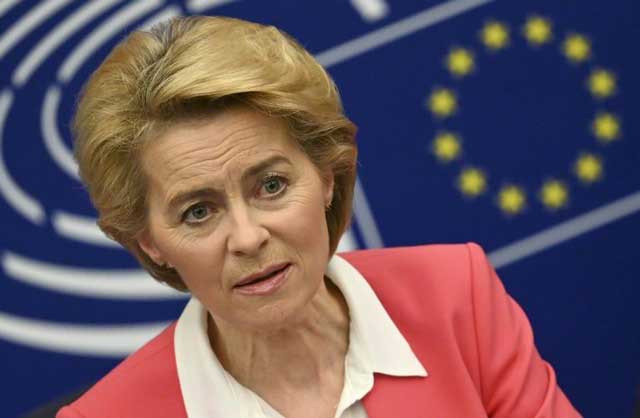
Brussels, Belgium | AFP | Germany’s Ursula von der Leyen, who takes the reins of the European Commission on Sunday, is a loyal confidante of Chancellor Angela Merkel whom she served as defence minister for six difficult years.
The political blue-blood, medical doctor and mother-of-seven was long considered a likely successor to Merkel but had seen her domestic political star fade in recent years.
Now the ambitious 61-year-old takes control of the commission, the EU’s powerful executive arm that puts into action the will of the bloc’s often divided member states.
Picked for the role in June, von der Leyen’s entry to the EU stage was rocky, securing only a razor thin majority in the European Parliament after emerging as the surprise winner from weeks of backroom deal-making and power plays.
Crucially, she has the backing of French President Emmanuel Macron, who appreciates her cooperation on Franco-German defence issues at a time of deepening rifts between Berlin and Paris.
But that link to Macron, an increasingly divisive figure in Europe, cost her when an unprecedented three nominees to join her team of commissioners were refused by MEPs, delaying the launch of her tenure by a month.
Brussels-born, fluent in French and English, and with a degree from the London School of Economics, she has cultivated a network of contacts in Europe and across the Atlantic.
A strong proponent of greater German engagement on the world stage and closer EU integration, she has in the past advocated a “United States of Europe”.
A life-long high achiever, von der Leyen has perhaps drawn the most animosity for her best-in-class style, the persona of a super-mum with iron discipline and a perfect hairdo that some voters find unnerving.
– ‘The soloist’ –
Von der Leyen is the only Merkel cabinet member to have been there since the beginning in 2005, having run first the family affairs and then the labour ministry.
In 2013 she became Germany’s first female defence minister, a notoriously difficult portfolio given post-war Germany’s touchy relationship with military affairs and frequent defence equipment failures.
During her term, Germany has deployed troops in missions from Afghanistan to Mali while drawing frequent political fire from US President Donald Trump for what he considers Berlin’s insufficient military spending.
In the tough post, von der Leyen has weathered scandals over far-right extremists within the army, controversial contracts with business consultancies and cost over-runs, including for the renovation of a vintage naval vessel.
She was once dubbed “the soloist” for her go-it-alone style, and a recent poll by Bild am Sonntag newspaper rated her as the second-least popular member of Merkel’s cabinet.
– Political outsider –
She was born as Ursula Gertrud Albrecht on October 8, 1958 in Brussels, where her father Ernst Albrecht worked as a senior European Commission official, and lived there until age 13.
As the daughter of Albrecht, who went on to become state premier of Lower Saxony for the conservative CDU, she spent her late teenage years under police protection at a time when leftwing extremists were targeting political and business figures.
The threat forced her to move to London to live in an uncle’s flat under the assumed name of “Rose Ladson”, and kept a security detail at her side well into adulthood.
A top-grade student, she studied first economics then medicine, going on to work in a women’s clinic.
She interrupted her career to be a housewife when her husband, a professor of medicine, won a scholarship to Stanford.
She joined the CDU at age 32 and entered the Lower Saxony parliament, going on to win her first Bundestag seat in 2009.
Von der Leyen has remained an outsider in the traditionally conservative and male-dominated CDU.
In a rare political gamble, she broke party ranks in 2013 to push for a women’s quota in corporate boardrooms.
She once advocated that police team up with internet service providers to block child pornography — a plan critics charged would create an online system of censorship, or “Zensur” in German, earning her the nickname “Zensursula”.
Like several other German politicians, she has faced accusations of plagiarism in her doctoral dissertation, but survived politically when no serious misconduct was found.
 The Independent Uganda: You get the Truth we Pay the Price
The Independent Uganda: You get the Truth we Pay the Price



